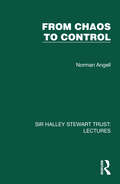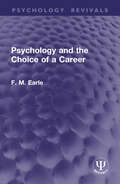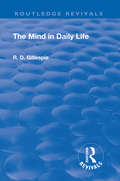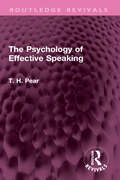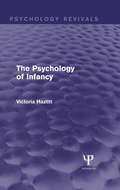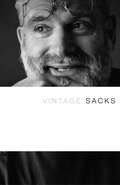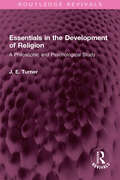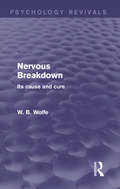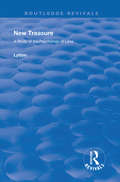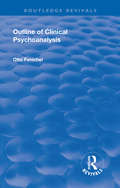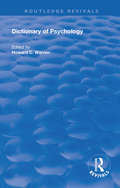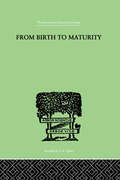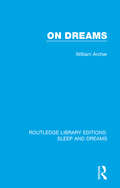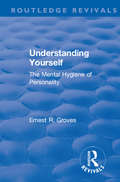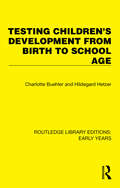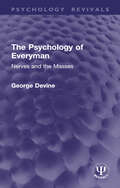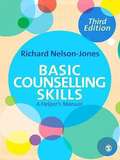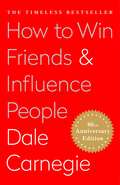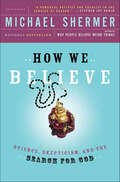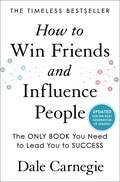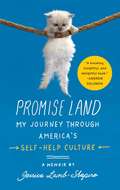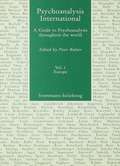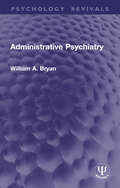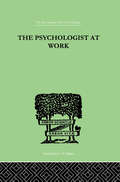- Table View
- List View
From Chaos to Control (Sir Halley Stewart Trust: Lectures)
by Norman AngellOriginally published in 1933, this volume From Chaos to Control represents the expansion of notes used in the delivery of the Halley Stewart Lectures for 1932–1933. Following on from the economic lecture of the previous year, this title covers “the psychology of popular understanding, of the nature of the public mind in relation to the technical problems discussed by last year’s lecturers; a problem of education, of politics.”This book is a re-issue originally published in 1933. The language used and views portrayed are a reflection of its era and no offence is meant by the Publishers to any reader by this re-publication.
Psychology and the Choice of a Career (Psychology Revivals)
by F. M. EarleOriginally published in 1933, Psychology and the Choice of a Career formalizes the art of vocational guidance, which was growing in public interest at the time. It sets out the points to consider when choosing a career path and the abilities you may need. It was a valuable tool to those seeking employment for the first time in the early twentieth century. Today it can be read in its historical context.
Revival: The Mind In Daily Life (1933) (Routledge Revivals)
by R. D. GillespieThis book is an elementary exposition. It contains no more technically than seemed readily understandable by the intelligent layman and the medical student desiring a merely general introduction to modern views on the motives of human conduct and the mental processes of which that conduct is the expression. Part I gives some account of processes and motives that are universal and therefore normal. Part II is written from the angle of the physician who sees the results, always common but nowadays more frequently discussed, of the miscarriage of the normal development of human beings as such.
The Psychology of Effective Speaking (Routledge Revivals)
by T. H. PearFirst published in 1933, The Psychology of Effective Speaking studies voice as an expression of personality. This book also criticises the education of its time, but not always destructively. It asks why, since people speak, they should not speak better. It suggests that if democracy is to succeed, rapid increase in the effectiveness of vocal communication is urgently necessary, and that this improvement begin in the lower classes of the schools. This book will be of interest to students of rhetoric, communication and psychology.
The Psychology of Infancy (Psychology Revivals)
by Victoria HazlittOriginally published in 1933, this volume was the result of many years’ careful first-hand study of child psychology enriched by the author’s unusually wide experience in dealing with the subject with students. It was intended to follow the development of children from infancy to adolescence, but was cut short due to the author’s untimely death. The book makes available the results of modern experimental work of the time, much of which was published in scattered journals. Chapters deal with the development of sensory and muscular control, including walking and talking, and with the development of the intellectual, emotional and social life of children up to three years of age. A pioneer in the development of experimental psychology Hazlitt’s work can now be enjoyed again in its historical context.
Vintage Sacks
by Oliver SacksVintage Readers are a perfect introduction to some of the great modern writers presented in attractive, accessible paperback editions."It is Dr. Sacks's gift that he has found a way to enlarge our experience and understanding of what the human is." --The Wall Street JournalDubbed "the poet laureate of medicine" by The New York Times, Oliver Sacks is a practicing neurologist and a mesmerizing storyteller. His empathetic accounts of his patients's lives--and wrily observed narratives of his own--convey both the extreme borderlands of human experience and the miracles of ordinary seeing, speaking, hearing, thinking, and feeling. Vintage Sacks includes the introduction and case study "Rose R." from Awakenings (the book that inspired the Oscar-nominated movie), as well as "A Deaf World" from Seeing Voices; "The Visions of Hildegard" from Migraine; excerpts from "Island Hopping" and "Pingelap" from The Island of the Colorblind; "A Surgeon's Life" from An Anthropologist on Mars; and two chapters from Sacks's acclaimed memoir Uncle Tungsten.From the Trade Paperback edition.
Essentials in the Development of Religion: A Philosophic and Psychological Study (Routledge Revivals)
by J. E. TurnerFirst published in 1934, Essentials in the Development of Religion was written with the conviction that the psychological and philosophical analysis of all phases of religious experience, even those which may be accounted the highest, is capable of yielding results of inestimable importance which could be attained in no other way. Dr. Turner discusses the historical development of the philosophy of religion and reveals topics that have been presupposed or embodied in regular human life. The book will be of interest to students of philosophy, religion and psychology.
Nervous Breakdown: Its Cause and Cure (Psychology Revivals)
by W. B. WolfeOriginally published in 1934, excerpts from the original preface read: "A Nervous breakdown is a terrifying experience. When it occurs, the patient, his family, and often his friends are panic-stricken. No one knows just what to do with the patient, and the patient is incapable of helping himself. … What should be done? If you think you have a nervous breakdown, it is your first duty to consult a competent and reputable physician, preferably your family doctor, and get a thorough and complete physical examination. If you cannot find any evidence of physical or organic disease, ask your doctor to recommend a reputable psychiatrist or medical psychologist. …This is a compact manual of help and self-help." Today this book can be read and enjoyed in its historical context.
New Treasure: A Study of the Psychology of Love (Routledge Revivals)
by LyttonFirst published in 1939, Lytton combines the essence of Sophocles quote "I was not born to share men’s hatred but their love" and draws on the work of Homer Lane to relate it back to Christian philosophy and teachings in this his homage to Christianity itself.
Revival: Outline of Clinical Psychoanalysis (Routledge Revivals)
by Otto FenichelA comprehensive presentation of the dynamics of neurosis, with valuable clinical material and a discussion of treatment; translated from the German. The wealth of clinical and theoretical data which psychoanalysis has been gathering for almost forty years as yet awaits an adequate systematization. A number of summaries and more or less complete systematic reviews of the field of psychoanalysis have been attempted and a number of them, of greater or less value, have been published with either the specialist or the general medical or or lay public in mind. Dr. Fenichel’s Outline is not one of these attempts. It is rather a systematized and almost impersonal presentation of clinical data which psychoanalysis has collected in the course of almost forty years and Dr. Fenichel frankly sacrifices simplified clarity to systematic completeness. The clinician will find it a very useful reference book; the general medical reader or the psychologist will find it to be a plain statement of fact made without prejudice or special preference to any of the variety of currents in present day psychoanalytical thought. It is the first outline of what the psychoanalytical trends are in the field of clinical work, leaving out the controversial attitudes which are always to be found in a living scientific discipline that has not yet become dogmatized.
Dictionary of Psychology (Routledge Revivals)
by Howard C. WarrenFirst published in 1935, this volume was designed to explain a range of technical psychological terms along with some amendments on usage. Howard C. Warren includes terms from fields related to 1930s psychology, such as folk-lore, religion, education and physiology, as well as more frequently used foreign terms.
Ethnicity and Empire in Kenya
by Myles OsborneThis book is about the creation and development of ethnic identity among the Kamba. Comprising approximately one-eighth of Kenya s population, the British considered the Kamba East Africa s premier "martial race" by the mid-twentieth century: a people with an apparent aptitude for soldiering. The reputation, indeed, was one that Kamba leaders used to leverage financial rewards from the colonial state. However, beneath this simplistic exterior was a maelstrom of argument and debate. Men and women, young and
From Birth to Maturity: An Outline of the Psychological Development of the Child (International Library Of Psychology Ser. #Vol. 67)
by Bhler, CharlotteFirst published in 1999. Routledge is an imprint of Taylor & Francis, an informa company.
On Dreams (Routledge Library Editions: Sleep and Dreams #1)
by William ArcherOriginally published in 1935, William Archer’s interest in dreams had persisted for over quarter of a century, for ten years of which he kept a careful record of his own dreams. These records alone form a valuable collection of material, of which Archer made good use in the writing of the book on dreams on which he was engaged at the time of his death; large parts of these dream-records are reproduced in this book. He left this book partly finished, partly in draft, and partly in the form of notes. In putting together this material the editor, Theodore Besterman, tries to carry out Archer’s intentions as closely as possible, and believed that he represented the book as he would have wished it to appear. It was unquestionably an important contribution to a difficult subject at the time, the result of many years’ study and reflection.
Revival: Understanding Yourself: The Mental Hygiene Of Personality (1935) (Routledge Revivals)
by Ernest R. GrovesThis book has a practical purpose. It seeks to help the reader to understand himself and his problems, that he may increase his successes, his fruit, and his satisfactions. The discussion centers about the conditions that shape personality, but the attempt of the book is not to rehearse the findings and theories of science but to provide the means by which the reader can come to a better understanding of himself.
Testing Children's Development from Birth to School Age (Routledge Library Editions: Early Years)
by Charlotte Buehler Hildegard HetzerOriginally published in 1935, Testing Children's Development from Birth to School Age highlighted the greatly increased interest in measuring the development of pre-school children by other means than the older, inadequate "intelligence tests". In the early part of the twentieth century the work done at the Psychological Institute of the University of Vienna under the general direction of Dr Karl Buehler had become favourably known throughout Europe and the United States. This was also especially true of the studies in child psychology directed by the authors Dr Charlotte Buehler and her one-time assistant, Dr Hildegard Hetzer. The book contains developmental tests for the first six years of life; techniques for testing small children; information on the construction of tests and the evaluation their results. Today it can be read and enjoyed in its historical context.
The Psychology of Everyman: Nerves and the Masses (Psychology Revivals)
by George DevineFirst published in 1935, The Psychology of Everyman: Nerves and the Masses was written as a short and simple treatise on ‘Functional Nerve Disease’ for doctors in general practice. The main object of the book was to enable the busy Practitioner to recognise psychological conditions and to treat them confidently along lines that they could understand. With focus at the time only on the physical symptoms of illness, it was making an important point to doctors that they must realise the psychological state should also get due attention. Very much of its time, today it can be read in its historical context.This book is a re-issue originally published in 1935. The language used and the views portrayed are a reflection of its era and no offence is meant by the Publishers to any reader by this re-publication.
Basic Counselling Skills
by Richard Nelson-JonesFrom leading skills expert Richard Nelson-Jones, this third edition remains the most accessible and practical introduction to the basic counselling skills essential for the helping professions. Steeped in vivid case examples, experimental activities and therapeutic dialogue, this book provides a thorough, step-by-step guide to the subject, working through each stage of the helping process. The key skills covered include: - Starting, structuring and summarizing the helping process - Active listening - Offering challenges and feedback - Facilitating problem solving - Improving clients' self-talk, rules and perceptions - Coaching, demonstrating and rehearsing - Managing resistance and changing referrals - Conducting middle sessions and terminating help Accessible, practical and concise, this bestselling book also discusses ethical issues and dilemmas, multicultural and gender aware helping, providing a master class for anyone using counselling skills in the course of their work.
How To Win Friends and Influence People: Large Print Edition (Deluxe Hardbound Edition Ser.)
by Dale CarnegieYOU CAN GO AFTER THE JOB YOU WANT...AND GET IT! YOU CAN TAKE THE JOB YOU HAVE...AND IMPROVE IT! YOU CAN TAKE ANY SITUATION YOU'RE IN...AND MAKE IT WORK FOR YOU! For more than sixty years the rock-solid, time-tested advice in this book has carried thousands of now famous people up the ladder of success in their business and personal lives. Now this previously revised and updated bestseller is available as eBook for the first time to help you achieve your maximum potential throughout the next century! Learn: * THREE FUNDAMENTAL TECHNIQUES IN HANDLING PEOPLE* THE SIX WAYS TO MAKE PEOPLE LIKE YOU* THE TWELVE WAYS TO WIN PEOPLE TO YOUR WAY OF THINKING* THE NINE WAYS TO CHANGE PEOPLE WITHOUT AROUSING RESENTMENT
How We Believe: Science, Skepticism, and the Search for God
by Michael ShermerA new edition covering the latest scientific research on how the brain makes us believers or skepticsRecent polls report that 96 percent of Americans believe in God, and 73 percent believe that angels regularly visit Earth. Why is this? Why, despite the rise of science, technology, and secular education, are people turning to religion in greater numbers than ever before? Why do people believe in God at all? These provocative questions lie at the heart of How We Believe , an illuminating study of God, faith, and religion. Bestselling author Michael Shermer offers fresh and often startling insights into age-old questions, including how and why humans put their faith in a higher power, even in the face of scientific skepticism. Shermer has updated the book to explore the latest research and theories of psychiatrists, neuroscientists, epidemiologists, and philosophers, as well as the role of faith in our increasingly diverse modern world.Whether believers or nonbelievers, we are all driven by the need to understand the universe and our place in it. How We Believe is a brilliant scientific tour of this ancient and mysterious desire.
How to Win Friends and Influence People: Updated For the Next Generation of Leaders (Deluxe Hardbound Edition Ser.)
by Dale CarnegieUpdated for the first time in more than forty years, Dale Carnegie&’s timeless bestseller How to Win Friends and Influence People—a classic that has improved and transformed the personal and professional lives of millions.This new edition of the most influential self-help book of the last century has been updated under the care of Dale&’s daughter, Donna, introducing changes that keep the book fresh for today&’s readers, with priceless material restored from the original 1936 text. One of the best-known motivational guides in history, Dale Carnegie&’s groundbreaking publication has sold tens of millions of copies, been translated into almost every known written language, and has helped countless people succeed. Carnegie&’s rock-solid, experience-tested advice has remained relevant for generations because he addresses timeless questions about the art of getting along with people. How to Win Friends and Influence People teaches you: -How to communicate effectively -How to make people like you -How to increase your ability to get things done -How to get others to see your side -How to become a more effective leader -How to successfully navigate almost any social situation -And so much more! How to Win Friends and Influence People is a historic bestseller for one simple reason: Its crucial life lessons, conveyed through engaging storytelling, have shown readers how to become who they wish to be. With the newly updated version of this classic, that&’s as true now as ever.
Promise Land
by Jessica Lamb-Shapiro"In writing this book I walked on hot coals, met a man making a weight-loss robot, joined a Healing Circle, and faced my debilitating fear of flying. Of all of these things, talking to my father about my mother's death was by far the hardest." The daughter of a widowed child psychologist and parenting author, Jessica Lamb-Shapiro grew up immersed in the culture of self-help, of books and pamphlets and board games and gadgets and endless jargon-filled conversations about feelings. It wasn't until she hit her thirties that Jessica began to wonder: if all this self-improvement arcana was as helpful as it promised to be, why wasn't she better adjusted? She had a flying phobia, hadn't settled down, and didn't like to talk about her feelings. Thus began Jessica's fascination with the eccentric and labyrinthine world of self-help. She read hundreds of books and articles, attended dating seminars, walked on hot coals, and attempted to conquer her fear of flying. But even as she made light of the sometimes dubious effectiveness of these as-seen-on-TV treatments, she slowly began to realize she was circling a much larger problem: her mother's death when she was a toddler, and the almost complete silence that she and her father had always observed on the subject. In the tradition of Augusten Burroughs, Jessica Lamb-Shapiro illuminates the peculiar neuroses and inalterable truths that bind families together, whether they choose to confront them or not. Promise Land is a tender, witty, and wise account of a young woman's journey through her own psyche toward the most difficult stage of grown-up emotional life: acceptance.
Psychoanalysis International, V.1: A Guide to Psychoanalysis Throughout the World (Psychoanalysis International Ser. #2)
by Peter KutterIt is well known that the cradle of psychoanalysis was in Vienna, the scene of Sigmund Freud's activities at the beginning of the century. But how and when did psychoanalysis reach the other countries of Europe? What development did it undergo there? How did the different mentalities, political and cultural backgrounds as well as the personal particularities of its respective advocates affect psychoanalysis? What was its position in the past and what is its position today? These and other questions on the varied development and the present situation of psychoanalysis in the countries of eastern and western Europe are investigated by renowned psychoanalysts drawing on the experience and knowledge acquired in their own work. The result is a new conpendium on psychoanalysis in Europe containing all up-to-date information. Informative and instructive, at times as exciting as a detective story, Psychoanalysis International will possibly be of interest even to non-analysts.
Administrative Psychiatry (Psychology Revivals)
by William A. BryanOriginally published in 1937, Administrative Psychiatry was the first book to present theory and practice in a hospital for psychiatric patients. Every detail of the organization and direction of a psychiatric hospital is described in this volume. Everything advocated in this volume had passed the test of actual trial, the principles set forth having been in continuous operation over a period of years before the book was written. A pioneering text at the time, today it can be read in its historical context.This book is a re-issue originally published in 1937. The language used is a reflection of its era and no offence is meant by the Publishers to any reader by this re-publication.
The Psychologist At Work: An Introduction to Experimental Psychology (International Library Of Psychology Ser. #Vol. 106)
by Harrower, M RFirst Published in 1999. Routledge is an imprint of Taylor & Francis, an informa company.
